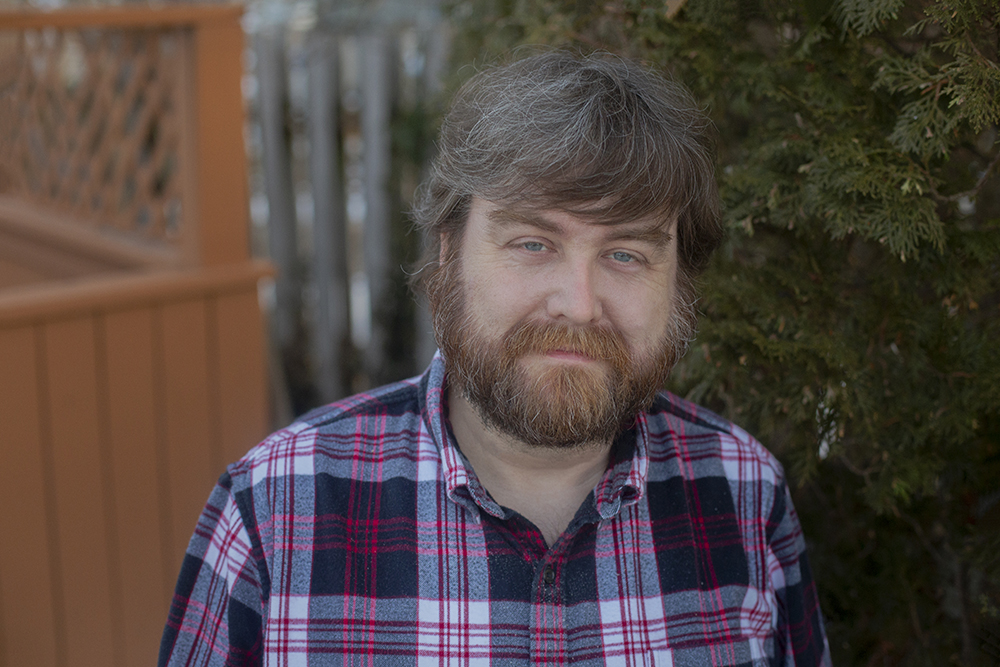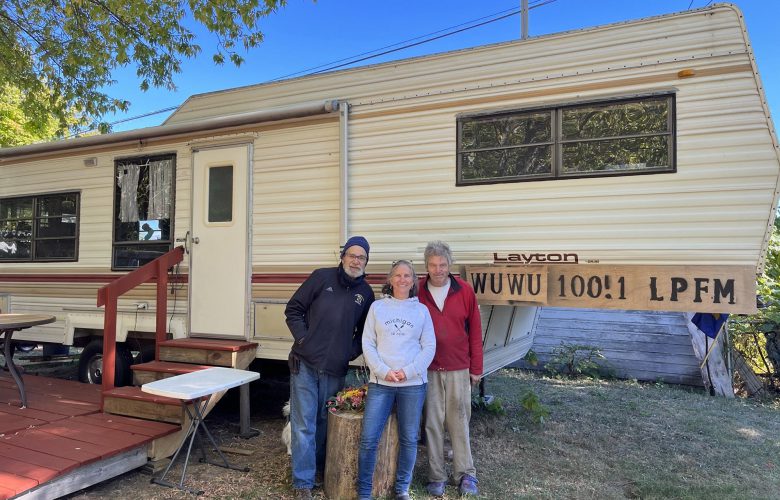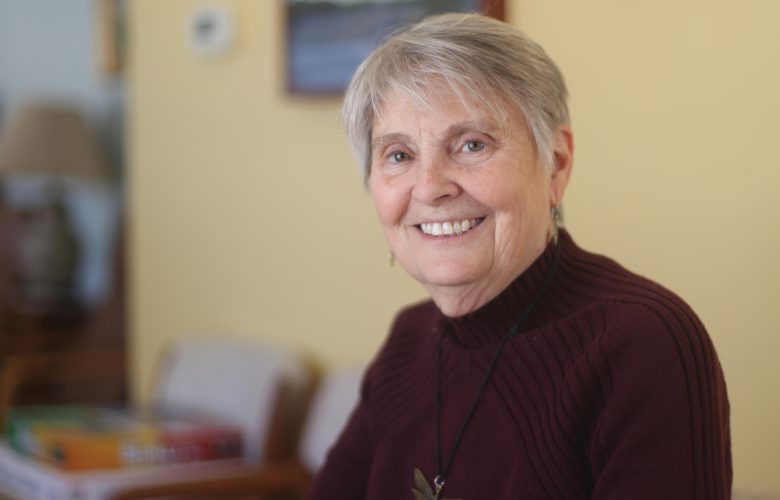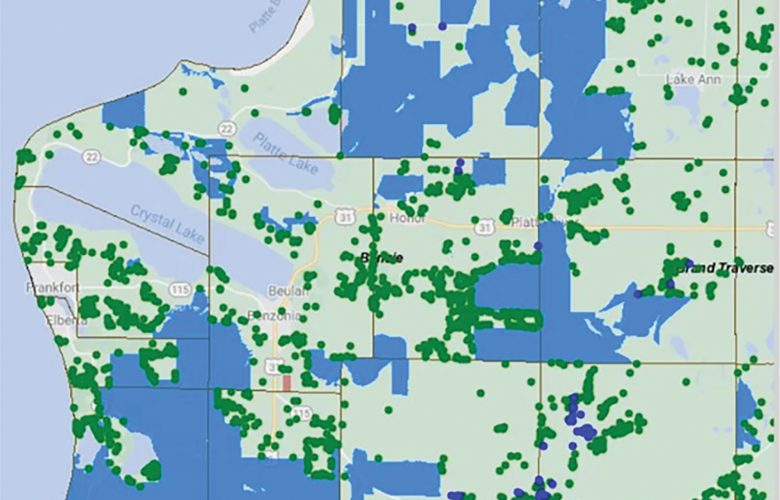Questions & Answers with community faces
Kevin Crawford (48) grew up in Frankfort, where he graduated from high school in 1993. He attended Albion College to obtain a Bachelor’s degree in religious studies before attending Yale Divinity School to acquire a Master of Arts degree in religion in 2002. He then spent the following 15 years working for the Yale library system, ending up in the Special Collections department of the divinity library. (During that time, he also obtained a second Master’s degree, this one in library science in 2008 from Southern Connecticut University.)
In 2017, Crawford left Yale to dedicate more time to a role-playing-game-publishing business that he had first begun in 2010. As this new career could be done anywhere, Crawford chose to return to Benzie County, where he had family and memories. Taking an apartment in downtown Beulah in the spring of 2017, he spent a year looking around the area before beginning a series of land purchases that ended in acquiring 130 acres west of Benzonia. After starting a small orchard on the property soon after the purchase, he began constructing a house last spring, and he hopes to be in it by this coming summer.
Meanwhile, Crawford recently launched his 11th Kickstarter campaign for a new role-playing game, “Cities Without Number.” Though that campaign is still ongoing, he recently passed a pretty big milestone—Crawford’s Kickstarter campaigns have grossed more than $1 million online for his games.
Continuing with our interview series on impactful Benzie County characters, The Betsie Current caught up with Crawford as he was just launching his new Kickstarter campaign.
The Betsie Current: Back when you were a librarian for Yale, what did that look like? Everyone knows—more or less—what a librarian does, but what does a librarian do at a prestigious university like that? What did a typical day of work look like for you back then?
Kevin Crawford: While I did obtain a Master’s degree in library science around 2008 or so, I was always categorized as a “library assistant” rather than a full librarian—a distinction of great importance to librarians and no perceptible difference to anyone else. My job in Special Collections largely revolved around cataloging antique documents and receiving visiting scholars. Most of them came to access Yale Divinity’s vast collection of missionary papers, diaries, records, and other printed rarities. We could keep only a fraction of these on-site at the divinity library, so much of the work involved shuttling boxes of papers to and fro from the huge library shelving warehouses that Yale maintains. As Yale’s missionary history in China dates back to 1834, many of our visiting researchers were Chinese, coming to consult papers for information that wasn’t accessible there, after the turmoil of the 20th century.
Current: What made you want to work in the gaming industry? What do you enjoy about this line of work? What do you think is different about the games that you are creating from what is already out there?
Crawford: In truth, I stumbled into writing games by accident. I wanted to practice using some book-layout software for my own entertainment, and as I needed something to lay out, I wrote a role-playing game to fill the space. I put it up online on a whim, but the response suggested that I should do more of it. The work was surprisingly remunerative, and as the business could be done at home and in the way and manner that I chose to do it, there wasn’t much reason to linger in my former work. I continue to write games that are focused on supporting creative play, and the customers seem content to keep buying them.
Current: For our readers who are not familiar with them, can you explain what a role-playing game (RPG) is? What do you personally like about these games compared to others?
Crawford: Readers who remember “Dungeons & Dragons” back in the ’80s or who have noticed its more modern editions in YouTube streams or those who have watched the popular Netflix show Stranger Things will know what an RPG is. For everyone else, a quick synopsis is that players get together around a table with the rulebook—usually hundreds of pages thick—and some oddly-shaped dice to make up characters in some fantastic sci-fi or fantasy world. These characters are then put through various adventures in search of loot, glory, or whatever else they’re after. Each player comes up with their own character who they want to embody during a game; some examples of the characteristics for each player are strength, dexterity, intelligence, wisdom, charisma, skills, stealth, etc. Do you cast spells, are you a warrior or a thief, can you heal people? Then there is one player who makes up the adventures for the game and acts as a referee, using the rules and their own judgment to decide the outcome of player actions and choices. A “campaign” of play can last years, with dead characters swapped out for new adventurers and players joining or leaving the table as their schedules allow.
Current: We know that you do a lot of “campaigning” personally, when you play RPGs with your friends. (We might know someone who co-owns this newspaper and who plays with you regularly; cough cough Jordan Bates cough cough.) Can you give a few tips on a successful role-playing campaign?
Crawford: Like any social hobby, it depends on picking the right people for it. If you have a good group, you’ll probably have a good time, regardless of the specific game you play; and if you have a bad group, no rule book will save your evening. A good RPG player tries to cooperate with the rest of the group, make good choices when their character is out adventuring, and is willing to take the referee’s judgments with good grace. If you’ve got players with those qualities, you’re going to have a fun campaign.
Current: Likewise, you have used crowdfunding—particularly Kickstarter—as a way to fund, market, and sell the games that you have created professionally. That is a completely different kind of campaign, a Kickstarter campaign. Can you give us a few tips on how to run a successful Kickster campaign? Why did you choose to use crowdfunding? What are the pros and cons of using those types of platforms, especially within the gaming industry? What does someone who contributes to your Kickstarter get in return for their “donation” to your goal? (Of note: We ran a much smaller Kickstarter campaign back in 2014 to restart this newspaper, but you are grossing way more than we could ever have dreamed of!)
Crawford: Crowdfunding is a simple concept; you tell the public that you want to make something, and you invite them to give you money to make whatever it is in return for receiving the product when it’s done. For a writer, it is an excellent way to advertise to your fans and collect sales up front, but it also requires you to actually write the book after you have the money, which is something that some authors do not handle well. A writer needs to produce as much of a rough draft as possible before the crowdfunding campaign starts, both to prove that there’s something worth backing and to lessen the burden of finishing it afterward. It’s possible that the public won’t want your book after all and your labor will be wasted, but that’s a danger a would-be crowdfunder has to accept as their share of the risk. Besides, an author is seldom improved by writing less, whether or not it’s ever published. In my current Kickstarters, backers can receive a rough-draft electronic copy of the book immediately and then get a well-bound hardback copy once the book is complete and the print run has gone through.
Current: What does a typical day of work look like for you?
Crawford: I rise late and use the daylight hours for errands, email, and necessary chores. After supper, I begin work at the computer with writing, rewriting, and discarding text, designing page layouts, and keeping my account books. I continue until around three or four in the morning, and then it’s time for bed. When you do your own publishing, you can sell as much as you can write, but you need to write incessantly. There are no days off.
Current: How old were you when you played your first RPG? Do you remember who was in your campaign? How have you witnessed the gaming world itself change since you first started playing? And/or how have you witnessed the world change its views on gaming?
Crawford: Role-playing games have waxed and waned in popularity from when I started as a boy back in 1983, but they swelled considerably during the pandemic. People wanted to find fresh distractions that could be played over Zoom or Discord, where you didn’t have to keep track of a game board or manage playing pieces. I’m sure there will be a degree of fading for RPGs in a post-pandemic world, but the fresh blood introduced to the hobby will linger and have their own new ideas about how a game should work. What those will be—I wouldn’t venture to say just yet.
Current: What kinds of things do you do for fun, when you are not working? What other things are you involved with? How did you get involved with them, and why are you passionate about these causes?
Crawford: I have some land a little west of Benzonia, where I’ve fenced an acre of orchard that occupies me, and where I’m trying to get acquainted with the soil well enough to grow a dozen or so acres of hay, as my grandfather once did. I have some woodworking tools out there, and a pole building that might yet become a cider house. In general, I try to spend as much time as possible working with physical objects, as my work has me spending so long with intangible words. Writers, as a rule, are unfortunately prone to taking words much too seriously and mistaking a thing said for a thing substantial. My radishes are less impressed with talk, and I have yet to persuade my cherry trees that there’s no reason they should refuse to bear.
Current: How have you seen Benzie County/Northern Michigan change since you grew up here? What are your hopes for the area in the future?
Crawford: I spent the first 20-odd years of my life living here, before going off to Yale for a degree around 2000 and then 15 years of work in their library system. I came back in 2017, and while there were changes, there were thankfully not many of them. You could tell that the population had grown a bit, and some new stores had come in while others had gone, but it was still the same place I had left. Of course, things are changing more these days with the surge in real estate prices and the rush of people moving away from the cities these past few years. It’s going to be a challenge finding housing for them here, particularly those without the budget for expensive land and houses.
Current: What are the biggest challenges and rewards of living/working in Benzie County and in Northern Michigan, in general? What is the best or most rewarding part of your job?
Crawford: The most rewarding part of my job is that I can do it exactly how I want to do it, in exactly the place I want to do it in. This is the place I was raised, and the one that has always been most comfortable to me. A walk in the forest, an afternoon tilling the fields, a cold late-winter day tapping maple sap—it’s a calm and peaceable place, compared to others I’ve known, with few any more lovely most of the year. But I have that luxury, because I have a healthy, location-independent income. For a lot of people, the math works differently when they’ve got to make summer wages stretch through winter, or find any rental at all to live in, let alone an affordable one. If Benzie County doesn’t find some way to make a working-age local’s life feasible, there won’t be anyone left in the county but retirees and remote workers.
Current: What could Northern Michigan/Benzie County do to attract more talented people to this area? What else does Northern Michigan/Benzie County need?
Crawford: Housing and jobs that can pay for that housing. Entertainment options and cultural events are nice, but they ultimately cater to those who already have the basic problems of housing and income solved—you don’t worry about what you’re going to do on Friday night if you don’t know where you’re going to be sleeping next month. The tremendous surge in housing prices over the past few years has made it difficult to live here, even when employers are anxious for more workers, because the wages they can pay can’t support a lake-house mortgage. Young families have a particularly hard time finding starter homes, and working singles have very little to pick from in the way of rentals. The economics of development make this a hard one to solve, but if nothing is done, there will be consequences.
Current: What are your favorite local events and activities? Any favorite dining, recreation, hiking spots?
Crawford: I always enjoy a walk on the Betsie Valley Trail, and just strolling along the back roads is always pleasant in the warmer months. I’m not much given to social events, as my work doesn’t allow a great deal of time away from it, but it’s nice to stop by for a sandwich from the East Shore Market in Beulah, or have lunch with my parents over at Papa J’s in Honor.
Current: What does your perfect winter day look like in Benzie County? How would you spend it?
Crawford: The perfect winter day consists of a book in front of a warm fire, snowfall outside the window, and the satisfying knowledge that I don’t have to go out and work in it. I think about that pleasant image sometimes—like yesterday, when I was changing a broken shear bolt on my tractor’s snowblower when it was eight degrees and windy. It’s a comforting thought for those times.
Kevin Crawford’s Sine Nomine Publishing has produced role-playing games for more than a decade; Crawford has been working out of Benzie County for the past five years. Sine Nomine Publishing’s games are available through the DriveThruRPG storefront at DriveThruRPG.com/browse/pub/3482/Sine-Nomine-Publishing online. His latest Kickstarter campaign can be found at Kickstarter.com/projects/SineNomineInc/cities-without-number and has a deadline of February 28, 2023.
Featured Photo Caption: Kevin Crawford (48) grew up in Frankfort, went away to college to obtain a Bachelor’s degree and two Master’s degrees, and spent 15 years working in the Yale library system before completely switching careers—now he creates games for a living. Photo by Aubrey Ann Parker.




